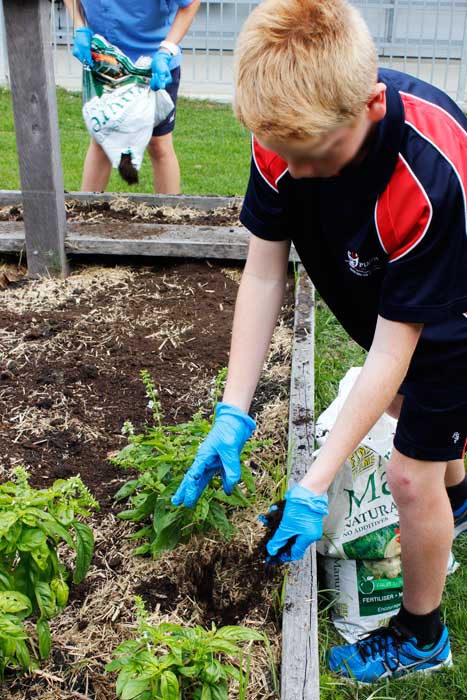Pimpama State Secondary College Year 7 Jump Start students are working on a project that seeks to tackle the wicked problem of food waste and transform our relationship with food.
Inspired by OpenIDEO's latest challenge, the students have begun the project like any other Jump Start project - by using design thinking to tackle complex problems. During Jump Start, students typically follow the Double Diamond design process, along with a range of design and startup tools.
Last week, as part of their research and familiarisation into food waste, students spent time planning and replanting the vegetable gardens. Students looked into the many factors which influence healthy and effective food growth such as plant nutrition, photosynthesis, climate, plant types, seasonal varieties etc.
Students planned for the vegetable gardens and during a subsequent class, spent time preparing the beds and then planting a large range of herbs and vegetables. Watching the successes and failures of the gardens over the coming months will help familiarise students with the challenges of urban food production, as well as some of the core issues surrounding food waste.
After the school holidays, students will begin to respond to and address some of the key problem areas by conceptualising and developing a range of products, services and systems which transform our relationship with food and reduce waste.
Students will also build knowledge around the role and impact that technology and the internet of things will have in this field.
They will explore, test, code, build and critique a range of existing smart plant care kits, such as Grove and 'Technology Will Save Us' DIY Thirsty Plant Kit. They will also analyse and use other existing plant monitoring products such as Parrot before conceptualising and developing their own solutions (whether they be technology-driven, or not). In doing so (and aligning with Australian Curriculum), they will further develop their understanding of the vital role that data plays in their lives, and how the data and related systems define and are limited by technical, environmental, economic and social constraints.
"Technologies enrich and impact on the lives of people and societies globally. Australia needs enterprising individuals who can make discerning decisions about the development and use of technologies and who can independently and collaboratively develop solutions to complex challenges and contribute to sustainable patterns of living. Technologies can play an important role in transforming, restoring and sustaining societies and natural, managed and constructed environments.
All young Australians should develop capacity for action and a critical appreciation of the processes through which technologies are developed and how technologies can contribute to societies. Students need opportunities to consider the use and impact of technological solutions on equity, ethics, and personal and social values. In creating solutions, as well as responding to the designed world, students consider desirable sustainable patterns of living, and contribute to preferred futures for themselves and others." - Australian Curriculum
In learning fundamental critical thinking skills to tackle problems, alongside digital technologies, the Jump Start program aims to prepare students with the skills and knowledge to thrive in the future.
A special thanks goes to teacher Maygen Schwarze, who is playing a large role in this project.





